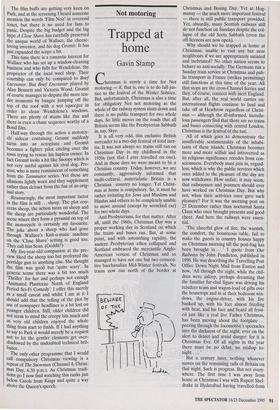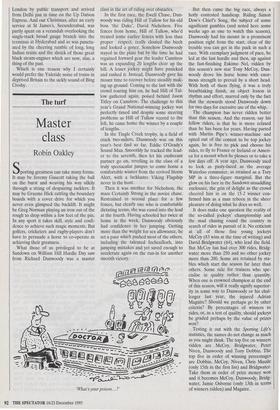Not motoring
Trapped at home
Gavin Stamp
Christmas is surely a time for Not motoring — if, that is, one is to do full jus- tice to the festival of the Winter Solstice. But, unfortunately, Christmas is also a time for obligatory Not not motoring as the whole of the railway system shuts down and there is no public transport for two whole days. So little moves on the roads that all Britain seems like the Presbyterian Sabbath in, say, Skye.
It is all very odd, this exclusive British surrender to a two-day festival of total iner- tia. It was not always so: trains still ran on Christmas Day in my childhood in the 1950s (not that I ever travelled on one). And in those days we were meant to be a Christian country. Today, however, we are constantly, aggressively informed that multi-cultural, materialistic Britain is a Christian country no longer. Yet Christ- mas at home is compulsory. So, it must be rather irritating for Jews and Muslims and Hindus and others to be completely unable to move around (except by wretched car) for two whole days.
And Presbyterians, for that matter. After all, until the 1960s, Christmas Day was a proper working day in Scotland on which the trains and buses ran. But, at some point, and with astonishing rapidity, the austere Presbyterian ethos collapsed and Scotland embraced the mercantile Anglo- American version of Christmas and so managed to have not one but two consecu- tive bacchanalian Mid-Winter festivals. No trains now run north of the border at Christmas and Boxing Day. Yet at Hog- manay — the much more important festival — there is still public transport provided. Yet, absurdly, many Scottish railways still do not function on Sundays despite the col- lapse of the old Scots Sabbath (even the off-licences are now open).
Why should we be trapped at home at Christmas, unable to visit any but near neighbours if we are appropriately satiated and inebriated? No other nation seems to behave so anti-socially. The Germans run a Sunday train service at Christmas and pub- lic transport in France (strikes permitting) still functions at this time of the year. All that stops are the cross-Channel ferries and they, of course, connect with inert England. But, after all, the real world carries on: international flights continue to land and take off at Heathrow regardless of Christ- mas — although the ill-informed, incredu- lous passengers find that there are no trains and buses connecting with central London. Christmas is the festival of the taxi.
All of which goes to demonstrate the insufferable sentimentality of the inhabi- tants of these islands. Christmas becomes more and more selfish and introverted as its religious significance recedes from con- sciousness. Everybody must join in, regard- less, which is why the public services which once added to the pleasure of the day are now withdrawn. How unfair, it may seem, that railwaymen and postmen should ever have worked on Christmas Day. But why not, when their activities once gave such pleasure? For it was the morning post on 25 December rather than nocturnal Santa Claus who once brought presents and good cheer. And here the railways were essen- tial.
`The cheerful glow of fire, the warmth; the comfort, the bounteous table, fail to make the guests in country houses happy on Christmas morning till the post-bag has been brought in . ' I quote from Our Railways by John Pendleton, published in 1896. He was describing the Travelling Post Office Down Night Mail from Euston and how, 'All through the night, while the chil- dren were asleep, perhaps dreaming that the familiar fur-clad figure was driving his reindeer team and wagon-load of gifts over the housetops and in at their bedroom win- dows, the engine-driver, with his fire banked up, with his feet almost frizzling with heat, and his face and beard all frost- ed just like a real live Father Christmas, has been moving about the footplate ... peering through the locomotive's spectacles into the darkness of the night, ever on the alert to detect and avoid danger: for it is Christmas Eve. Of all nights in the year there must be no delay, no mishap to- night . . .
But a century later, nothing whatever moves on the remaining rails of Britain on that night. Such is progress. But not every- where. The first time I was away from home at Christmas I was with Rupert Shel- drake in Hyderabad having travelled from London by public transport and arrived from Delhi just in time on the Up Datson Express. And our Christmas, after an early service at St James's, Secunderabad, was partly spent on a verandah overlooking the single-track broad gauge branch into the terminus at Hyderabad and so was punctu- ated by the cheering rumble of long, long Indian trains and the shriek of those great black steam-engines which are now, alas, a thing of the past.
Which is one reason why I certainly would prefer the Yuletide noise of trains in deprived Britain to the sickly sound of Bing Crosby.











































































































 Previous page
Previous page